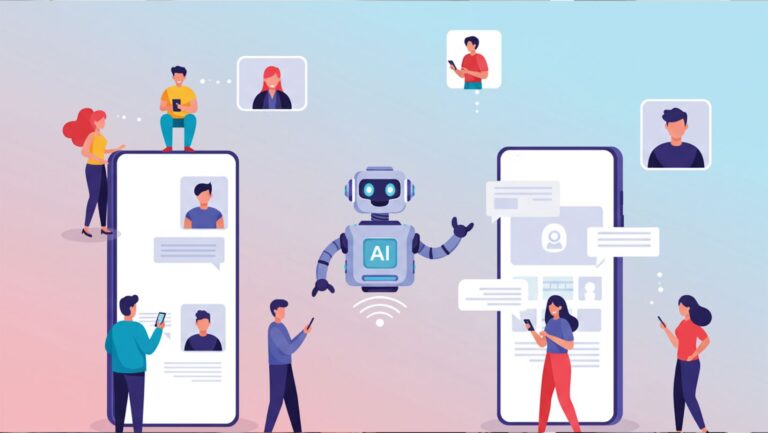In today’s world, where email is one of the main communication channels, marketers are constantly looking for new ways to attract attention to their products and services. One of the latest trends in marketing is the use of artificial intelligence to send cold emails. While this new development may raise concerns and doubts among some people, it is already beginning to have a major impact on the future of email and is leading to a true revolution in marketing. Discover how a sales AI assistant can revolutionize your customer engagement and boost your sales team’s productivity.
Benefits of using artificial intelligence in marketing
The first thing to note is that artificial intelligence in marketing allows you to automate the process of sending cold emails. This means that professionals no longer have to waste their time on mundane tasks such as composing and sending emails. Instead, they can focus on developing quality content that will attract the audience’s attention.
Artificial intelligence can also improve the quality of cold emails sent to potential customers. Thanks to machine learning algorithms, it can analyze responses to previous emails and, based on this information, improve the content and structure of subsequent messages. In this way, spam emails can be minimized, and the efficiency of communication with customers increases.
Message personalization options
With the help of artificial intelligence, marketers have greater flexibility in personalizing cold emails. Thanks to data analysis, he can independently select the most suitable content and combine it with information about a specific recipient. This approach allows you to create more targeted and effective emails that better meet the needs of your audience.
However, it should be noted that this requires having a large amount of data about each client, as well as developing the right algorithms. So while personalizing cold emails with AI is a powerful tool, it may be limited for some companies, especially those with small audiences or insufficient data.
Increasing efficiency through customer behavior analysis
One of the key functions of artificial intelligence in marketing is the analysis of customer behavior. AI systems can track which emails were read, which prompted a response, and which were ignored. Then, based on this data, they can recommend the best actions for follow-up communications with customers.
In addition, artificial intelligence can analyze other parameters such as when emails were sent, the type of content that most recipients respond to, etc. This gives marketers valuable insights on how to improve and optimize their email campaigns.
New challenges and concerns
Along with the opportunities and benefits that artificial intelligence provides, its use also raises certain concerns and challenges. The main one is the potential threat to privacy and data security. Systems using artificial intelligence must be secure enough to prevent unauthorized access to customers’ personal information.

Additionally, academics and experts have also raised concerns about the potential for artificial intelligence to be misused in marketing, as it could be used to send mass spam emails or even manipulate customer behavior.
Focus on improving user experience
As mentioned earlier, AI in marketing has great potential to improve message personalization and improve the effectiveness of email campaigns. However, its capabilities are not limited to just this. Using machine learning algorithms, it can analyze user behavior on websites or apps and offer them the most relevant and interesting products or services. This approach not only increases the chances of successful sales but also creates a more convenient and pleasant experience for users.
Create more accurate forecasts and recommendations.
With predictive analytics capabilities, artificial intelligence can help marketers create more accurate forecasts and recommendations for their customers. Analyzing data obtained from cold emails, social media and other communication channels suggests which products and services may be of interest to a particular user. This way, marketing campaigns can be more targeted and effective.
Impact on the future of marketing strategies
As artificial intelligence technology advances, its impact on marketing strategies is expected to only grow. Many companies are already deciding to integrate artificial intelligence into their marketing process, and this trend will only increase. This approach can lead to lower marketing costs, as well as increase the competitiveness of companies that can more quickly adapt to market changes.
Psychology of consumer behavior
One of the benefits of using artificial intelligence in marketing is its potential to provide greater insight into the psychology of consumer behavior. Analyzing customer data and behavior can help identify the factors that influence their purchasing choices and motivation to act. Such information can be useful for developing effective marketing strategies that take into account not only logic but also the emotional component.
But not only marketing
Finally, it should be noted that artificial intelligence has the potential to say something about the future of not only marketing but also business in general. More and more companies are implementing artificial intelligence systems in various areas of their activities, such as human resource management, logistics, and operations management. However, it must be taken into account that the use of artificial intelligence does not exclude the need for the presence of the human factor, and accurate predictions about its future in business are still difficult to make.
The future of marketing in the context of artificial intelligence technology
An increasing number of companies, both large and small businesses, are already making attempts to integrate artificial intelligence into the marketing process. Many of them see great potential in using this technology and recognize it as one of the key tools in their arsenal of marketing strategies.

The main benefit this brings is the automation of tasks. Many AI processes, such as creating and sending emails and analyzing data and customer behavior, can be completed without human intervention. This allows resource-intensive companies to optimize their workflows and save time and money.
Another important benefit is increased conversion and sales. By better analyzing and predicting customer behavior, AI can help optimize sales strategies and offer more relevant products or services. It can also improve customers’ overall brand experience and increase loyalty.
The future of email
Despite some challenges and concerns, the popularity and application of artificial intelligence in marketing will only grow from now on. It’s already having a significant impact on the future of email, and we can expect it to become increasingly integrated into the cold email process. Whether it will become the only solution for effective email marketing in the future, only time will tell. However, there is no doubt that artificial intelligence is already changing the marketing landscape and will continue to do so in the future.



